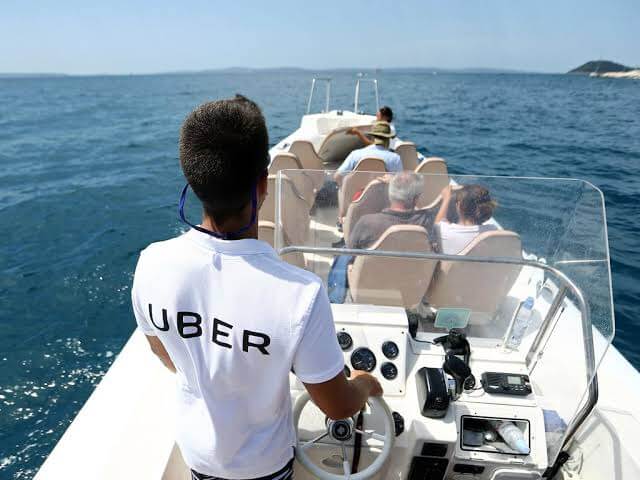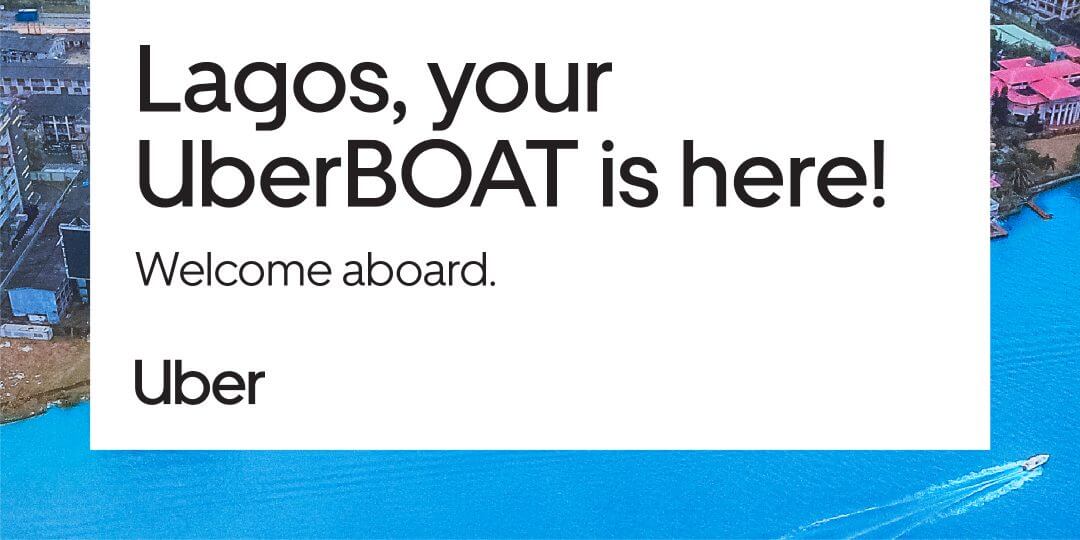Uber is testing the waters in Lagos with UberBOAT
Now that UberBOAT is here, should Gokada's boat service, Gboat, be worried?

Uber—one of the leading global ride-hailing companies—has launched a water transportation service, called, UberBOAT, in Lagos, Nigeria.
The service is launched in partnership with the Lagos State Waterways Authority (LASWA) and Texas Connection Ferries Limited, an 18-year-old Nigerian ferry services provider.
Uber's ride-hailing service was first launched in the commercial capital of Nigeria, Lagos, in July 2014. Two years later, it launched in the federal capital, Abuja. In July 2019, Uber launched in Benin. Its arch-rival, Bolt (formerly Taxify), however, operates in nine cities in Nigeria: Abuja, Benin, Calabar, Ibadan, Kano, Lagos, Owerri, Port Harcourt, and Uyo.
According to a statement released by Uber Nigeria on Friday, UberBOAT will undergo a pilot phase for two weeks, from October 11 to October 25, 2019. During this period, the on-demand waterway service will be available only on weekdays to and fro Ikorodu and Falomo at a flat rate of ₦500/trip.
Lagos, Your UberBOAT has arrived ! 🚢
— Uber Nigeria (@UberNigeria) October 11, 2019
Want to beat traffic or be on time? Sit back and enjoy the cruise!
Book your trip and head out for a ride via https://t.co/37IB9BglD5.
Click on https://t.co/PlQVIYtX2B to read more about UberBOAT.
Welcome aboard!#UberBOAT #UberOn pic.twitter.com/vyyOMn7LSm
Two boats, with the capacity to convey 35 people, will be completing two trips each daily throughout the pilot phase. Unlike Uber ride that could be booked instantaneously, you must reserve your seat on UberBOAT 24 hours ahead of time.
With this launch, Nigeria becomes the fourth country where UberBOAT is operational. The three other countries are India, Egypt and Croatia.
UberBOAT is here, should Gboat be worried?
The launch of UberBOAT has been four months coming. Uber's Chief Business Officer, Brooks Entwistle, announced the firm's plan to launch an on-demand ferry service in Lagos at a conference in June. This was the same month Gokada launched its boat service, Gboat.

For Gokada, UberBOAT might bring a déjà vu feeling. The bike-hailing startup had temporarily shut down in August due to increased competition, regulatory hurdles and operational issues.
Gboat is a joint venture between Lagos Boats, established in June 2018, and Gokada. Gossy Ukanwoke, Founder of Lagos Boats, told Business Insider by Pulse that the arrangement is a win-win for both parties. He said, "Gokada provides the customer base, while we work on the logistics". Gboat currently covers Lekki, Victoria Island and Ikoyi waterways at ₦200/trip.
GBoaters going home after work using GBoat @GboatNg // Living around Lekki and work in VI?
— Gossy Ukanwoke (@gossyomega) August 1, 2019
Go home in 10mins with N200 only pic.twitter.com/hczMiA9i8s
Gboat has no cause to worry, at least not yet, because UberBOAT could complement its service. The final destination of UberBOAT is Falomo, Ikoyi, which means people heading to Lekki can continue their cruise with Gboat. Moreover, Uber is still testing the waters with UberBOAT—there is a possibility of discontinuation (if it does not gain traction).
That being said, Uber and its partners—LASWA and Texas Connections Ferries—have 38 years of experience transporting people and goods among them. The involvement of LASWA shields UberBOAT from any shenanigans of the National Association of Tourist Boat Operators and Waters Transporters. Uber also have a larger customer base and fatter pocket than Gokada and Lagos Boats.
UberBOAT's station is also a plus. Ikorodu road and its attendant traffic congestion are terrible, the residents will definitely embrace an alternative.
Compared to road transport, travelling on water is safer. According to data from Nigeria Watch, 1,607 lives were lost in 180 boats accidents between June 2006 and May 2015. Road accidents in 2006 alone, however, was 9,114 with 22,334 casualties.
In the meantime, Gboat can leverage on UberBOAT to warm itself into people's heart. A lot of people don't know it's working.
[Video] Good Morning @jidesanwoolu & @drobafemihamzat , this is the current state of Agric/Isawo road in Ikorodu, Lagos State this MORNING, residents couldn't access their home NOW. We urge you to expedite actions on the repair of the road. pic.twitter.com/q1egTo3hzt VIA @TrackaNG
— Avoid Lagos Traffic (@trafficbutter) October 12, 2019
Why is Uber launching UberBOAT?
Uber wants to be the 'operating system for everyday life'
The launch of UberBOAT perfectly fits into the vision of the 10-years-old ride-hailing company to be the go-to platform for transportation and delivery service. This will translate to taking up a super app status like the Indonesian company, Gojek.
We want to be the operating system for your everyday life.
Uber, at its September launch event, announced the facelift of its app with new features. In addition to its ride-hailing service, Uber also offers bike-hailing service (Uber Bike), air taxi (Uber Elevate/Uber Air), public transportation service (Uber Transit) and logistics service (Uber Freight). There is also Uber Health, which carries patients to and fro the clinic, and Uber Pay, which allows customers to deposit cash at partner-stores to credit their Uber account.
Most of these features and services are not available globally yet. Uber only operates in 23 African cities across Egypt, Ghana, Kenya, Morocco, Nigeria, South Africa, Tanzania and Uganda.
In addition to its ride-hailing service, Uber operates UberBODA—its bike-hailing service—in Kenya and Uganda. In South Africa, there is UberEATS—its food delivery service. In Egypt, there is Uber Tuk Tuk—its three-wheel ride-hailing service, Uber Scooter, and UberBOAT.
African megacities provide growth opportunities
The loss-making public company, Uber, has pursued aggressive expansion since its launch in 2009. But it focused only a handful of major cities in Sub-Saharan Africa.
Bolt, on the other hand, doesn't mind the trickles from smaller African cities. Since it was first launched in Africa in 2016, Bolt now operates in 44 cities across Ghana, Kenya, Nigeria, South Africa, Tanzania and Uganda.
In the pursuit of profitability, however, Uber has mulled plans to launch in Rwanda, Ivory Coast, Senegal and Mauritius. According to Uber's Chief Business Officer, Brooks Entwistle, the company is currently in talks with the regulators in Ivory Coast and Senegal.







Comments ()